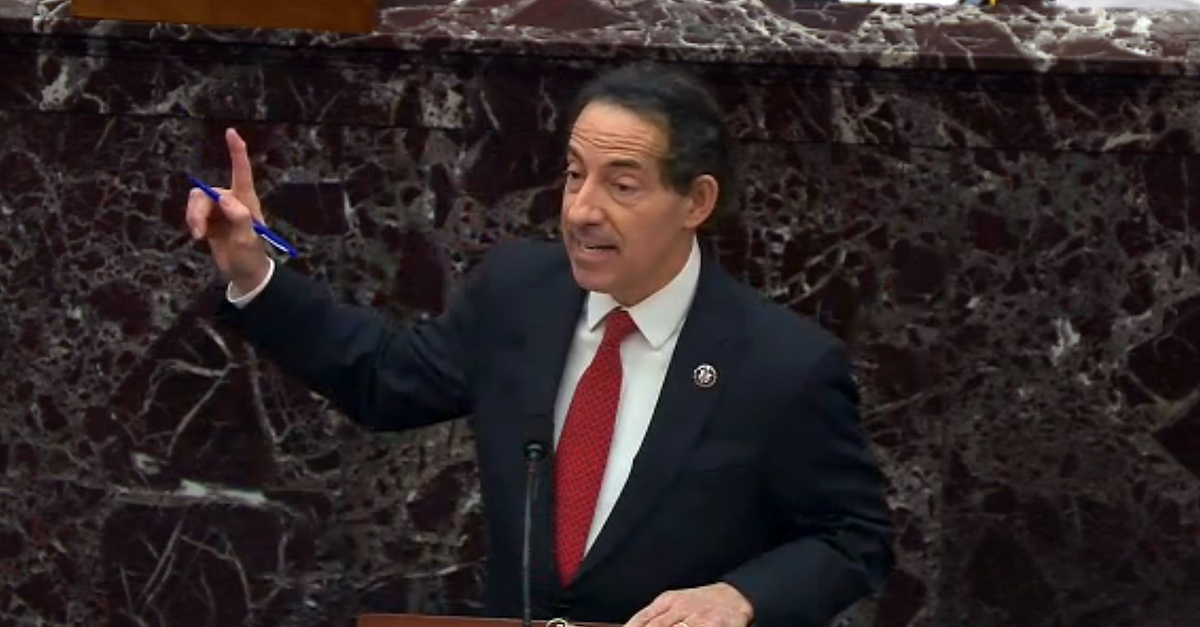
Rep. Jamie Raskin (D-Md.), the lead manager for the impeachment, delivered an emotional speech about his daughter on the first day of former President Trump’s second Senate trial.
Six Republicans broke ranks in affirming the constitutionality of the second Senate impeachment trial against Donald Trump on Tuesday, a day when the dry and procedural matter of whether the Framers envisioned proceedings against a former president took personal and emotional turns.
GOP Senators Bill Cassidy of Louisiana, Susan Collins of Maine, Lisa Murkowski of Alaska, Mitt Romney of Utah, Ben Sasse of Nebraska, and Pat Toomey of Pennsylvania joined a unanimous Democratic caucus in pushing the proceedings out the front gate. Cassidy’s vote was the only surprise, joining the other five Republicans who previously cut through procedural objections to the proceedings advancing.
Representative Jamie Raskin, a Maryland Democrat serving as the lead impeachment manager, pushed back tears as he described his daughter Tabitha’s reaction after being whisked to safety after the Jan. 6 insurrection.
“I told her how sorry I was. I promised her it would not be like this again the next time she came back to the Capitol with me,” recalled Raskin, who lost his son to suicide on New Year’s Eve. “Do you know what she said? She said, ‘Dad, I don’t want to come back to the Capitol.'”
Struggling to maintain his composure, Raskin continued: “Of all of the terrible, brutal things that I saw and heard on that day and since then, that one hit me the hardest.”
It was a rare tug at the heartstrings in proceedings devoted to law and precedent: the basis of a rare, though not unprecedented, Senate trial of a former U.S. officeholder and first for an ex-president.
Colorado Democratic Rep. Joe Neguse, a lawyer and fellow impeachment manager, reached across the aisle to note how many conservative authorities agreed that the Constitution permitted and envisioned such proceedings. The names he rattled off included Ronald Reagan’s former solicitor general Charles Fried, Federalist Society co-founder and law professor Steven Calabresi and ex-10th Circuit Judge Michael McConnell.
“He’s a co-founder of the Federalist Society,” Neguse noted of Calabresi, referring to the judicial group that has served as kingmaker for scores of conservative judges and justices.
All Democrats, the House impeachment managers returned to a refrain warning against a “January exception,” a procedural loophole that would shield presidents who present a “danger to the Republic.”
“Impeachment would fail to achieve these purposes if you created, for the first time ever, despite the words of the Framers and the Constitution, a January exception,” Rep. David Cicilline of Rhode Island intoned.
In a meandering speech, Trump’s defense counsel Bruce Castor conceded what the 45th president has long denied—that his client lost a free and fair election.
“President Trump is no longer in office,” Castor noted. “The object of the Constitution has been achieved. He has been removed by the voters.”
His co-counsel David Schoen gave a speech more in line with his client’s now-deactivated Twitter account, lashing out at cancel culture and sounding what some interpreted as a warning of a second civil war if Trump is convicted.
“Under their unsupportable and tortured reading of the text, every civil who has served is at risk of impeachment if any given group elected to the House decide that was thought to be important service to the country when they served now deserves to be canceled,” said Schoen, who also claimed that the trial would open up “bigger wounds for the nation” than when it began.
“This trial will tear the country apart, perhaps like we’ve seen only once before in our history,” Schoen claimed, not elaborating on a statement widely interpreted as a threat of further violence if Trump was convicted.
Opening statements in Trump’s trial begin on Wednesday.
(Photo by congress.gov via Getty Images)